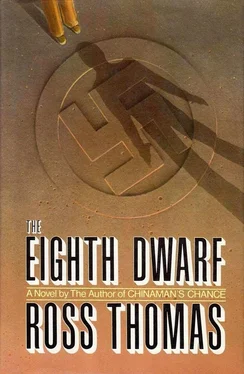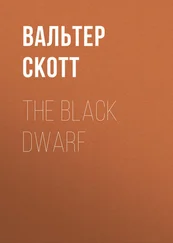“Try me.”
“He called Jackson an ‘ex-OSS hotshot.’”
“Hotshot I know from the Pole.”
“What Pole?”
“The one who taught me American English. A very funny fellow.” He was silent for a moment. Then he said, “What would happen, do you think, should this Jackson learn that the dwarf was playing a double game?”
“Nothing perhaps. He might only shrug — unless it turned out badly for him. In that case, I would hate to be the dwarf.”
Bodden was again silent for several long moments as he examined all that he had been told. “Then,” he said finally, “there are the British.”
She sighed. “I was wondering when you would get to them. I was almost hoping that you wouldn’t.”
“Why?”
“Because if the British find Oppenheimer first, then Berlin has additional instructions for you.”
“What?”
She dropped her gaze to her drink. “You are to kill him — somehow.”
“Well, now.”
There was yet another silence until, looking at him this time, she said, “Have you ever done anything like that before?”
He nodded. “I have killed, but I have never murdered. There is a difference. At least, I like to think there is. It makes my sleep more restful.”
She went back to the inspection of her drink. “Could you do it?”
This time the silence was longer than ever. Bodden at last decided that there was nothing to lose by being honest. “I don’t know,” he said. “It would depend on — on many things.”
She looked up at him. “Opportunity?”
“Yes, there is that. If the British had him locked up, there might not be any opportunity.”
She nodded. “That’s why I will also be going to Bonn. As I said, Berlin doesn’t expect miracles. But it would be no miracle if the British were to let his sister and her oldest friend in to see Oppenheimer, would it?”
Bodden frowned with his forehead. Distaste was written across the rest of his face. “They don’t expect you to kill him, surely?”
“No, but I could easily slip him the means to kill himself. It is really only a very small pill.”
“Which he would choose over a hanging.”
She smiled slightly, although there was no trace of humor in it. “If Berlin can’t have Oppenheimer for themselves, they would be quite happy for the British to hang him — or the Americans. But they won’t hang him — either of them.”
Bodden was beginning to understand. He nodded slowly. “Yes, I see. If Berlin is willing to pay twenty-five thousand dollars for an assassin, think what he must be worth to the British — not to mention the Americans.”
“They are very rare, I suppose,” she said. “Assassins. Good ones, anyway. Tell me, printer, do you ever think of yourself that way — as an assassin?”
“No,” he said. “Never.”
“I thought not.” She patted the bed by her side. “Sit over here — beside me. That way you won’t have to keep hopping up to fill my glass. We are going to finish it, aren’t we — your bottle — just to keep warm?”
Bodden rose. “I thought we might.” He kicked the chair over near the bed, placed the bottle on it, and sat down next to her.
“You know what they say about Berlin in the winter, don’t you?” he said.
“What?”
“That there’re only two places to keep warm — in bed or the bath.”
“You have no bath, of course.”
“Only a bed.”
“Then that will have to do.”
He kissed her then. She was quite ready for it, both her mouth and her tongue eager and exploring. When it was over, she leaned back on the bed, supporting herself on her elbows.
“There is no hurry, is there, printer?”
“None.”
“We will finish the bottle first and you can tell me about yourself and then we will go to bed. It has been a long time since I have been to bed with a man.”
“What about your young American?”
“He is a very nice boy and, like most boys, very eager, very impatient. Were you ever like that, printer — young and impatient and eager?”
“A long time ago.”
“Tell me about it Tell me about you and what you did before the war in Berlin.”
He leaned back and put an arm around her. She shifted slightly so that her head rested on his chest. “I had my own shop,” he said, “not far from the Adlon Hotel; do you know it?”
“A very fashionable district.”
“I was a very fashionable printer. The rich liked me — the rich and the poor poets. I printed their invitations and calling cards — the rich, I mean. No one was anyone unless they had them done by me. I did the best work in Berlin, and I was very expensive. By being expensive I could afford to print the poor poets. You know the kind of thing — slim volumes on thick paper. I also did commercial work — fancy brochures, things like that; more bread-and-butter stuff. And, of course, there was the political material. I printed that too, and kept on printing it even after I was warned not to. I was what your young American friend would call a very ‘hotshot’ Social Democrat at the time. They came for me eventually, the Gestapo. They wrecked the plant. I got to watch that. Then they took me away, and finally I wound up in Belsen. And there I broadened my political horizons.”
“So you could eat.”
“So I could eat.”
“You sound as though you like to live well, printer.”
“It is a weakness.”
“I suffer from it too. Do you think you ever will again?”
“Not unless a miracle happens — one of those kinds that you say Berlin doesn’t believe in.”
She was silent for a moment. Then she turned onto her stomach and looked at him. “Twenty-five thousand dollars can buy a great many miracles, printer. Twenty-seven, actually.”
He grinned and wrapped a strand of her hair around his finger. “You have dangerous thoughts, little one.”
“So do you.”
“I’m surprised.”
“At my thoughts?”
“That you didn’t mention them sooner.”
“It could be done.”
“It would also be dangerous.”
“No more dangerous than killing a man whom you really don’t want to kill.”
He gave the strand of hair a gentle tug. “I bet you even have a plan.”
She kissed him — a quick, friendly, warm, wet kiss. “You’re right, I do. Make love to me, printer. Make love to me and then I will tell you about my plan.”
“To abscond with twenty-five thousand dollars.”
“Twenty-seven, actually.”
He grinned again. “With that much money I could afford you, couldn’t I?”
She kissed him quickly again. “That’s right, printer. You could.”
On the way to the black-market restaurant, Leah Oppenheimer didn’t even seem to notice the huge old roadster or the stares that it attracted. She sat silently in the passenger’s seat, a silk scarf around her head and a small, shy smile on her lips: the kind of smile, Jackson decided, that a proper young woman would wear on her very first date.
After parking the car near the restaurant, he gave a shabbily dressed middle-aged man five cigarettes to watch it. For another two cigarettes the man offered to dust the car off with a dirty rag that he produced from underneath his hat. Jackson shrugged and paid him his price.
The restaurant was called the Blue Fox Cellar, and it was located in the bowels of a building that had been erected sometime in the late eighteenth century. There was nothing left of the building now except for a pile of rubble and a new, jerry-built entrance that was about as inviting as the entrance to a New York subway.
To get to the restaurant itself they had to go down a steep flight of stairs, then along a corridor, and through another door. But before they were allowed through that, they were inspected by an eye that peered out at them from a speakeasylike peephole. Jackson thought that the eye looked beady, but he didn’t say anything.
Читать дальше












